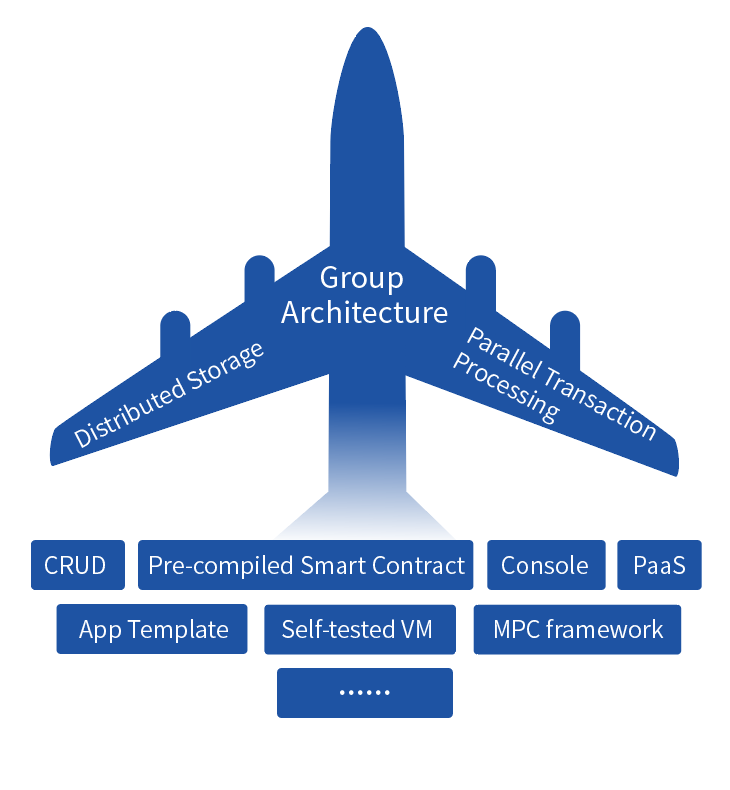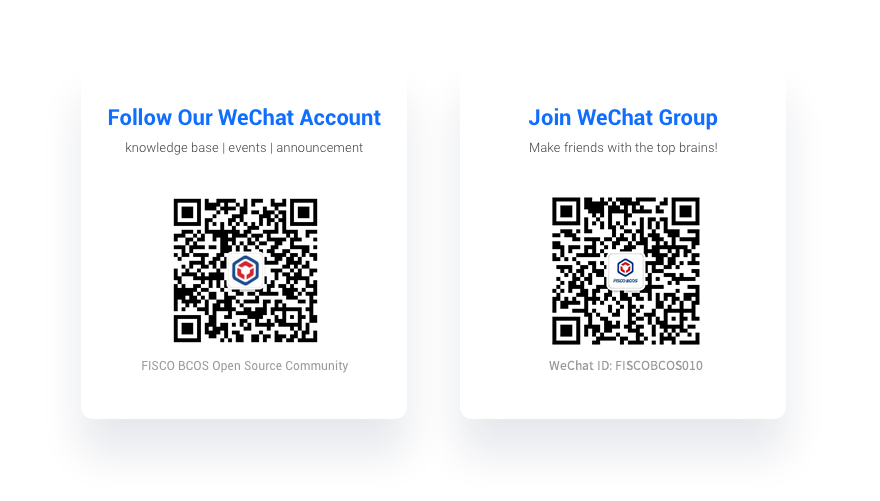English / 中文
This project implements a fair transaction protocol for cloud/fog computing based on FISCO BCOS.
The next paragraph describes how to run the code.
-
Download the source code
git clone https://github.com/wwe1428103707/FairTransactionForOutsourcingComputationUsingBlockchain.git
-
Download the important library from the following link
https://github.com/wwe1428103707/FairTransactionForOutsourcingComputationUsingBlockchain/releases/download/lib/libpaillier.a
-
cd FairTransactionForOutsourcingComputationUsingBlockchain/ -
sudo apt install -y g++ libssl-dev openssl cmake git build-essential autoconf texinfo flex patch bison libgmp-dev zlib1g-dev
-
mkdir -p build && cd build cmake .. sudo make
-
Replace all libpaillier. A files with the file linked below
-
sudo make
again.
-
start fisco-bcos
sudo apt install -y openssl curl cd ../tools/ sudo bash build_chain.sh -l 127.0.0.1:4 -p 30300,20200,8545 sudo bash nodes/127.0.0.1/start_all.sh -
Success will output a response similar to the following, otherwise, please use
netstat -an | grep tcpto check whether the machine’s30300~30303, 20200~20203, 8545~8548ports are occupied.try to start node0 try to start node1 try to start node2 try to start node3 node1 start successfully node2 start successfully node0 start successfully node3 start successfully
-
Execute the following command to check whether the process is started
ps -ef | grep -v grep | grep fisco-bcosIn normal situation, the output will be similar to the following. If the number of processes is not 4, then the reason why the process does not start is that the port is occupied.
fisco 5453 1 1 17:11 pts/0 00:00:02 /home/ubuntu/fisco/nodes/127.0.0.1/node0/../fisco-bcos -c config.ini fisco 5459 1 1 17:11 pts/0 00:00:02 /home/ubuntu/fisco/nodes/127.0.0.1/node1/../fisco-bcos -c config.ini fisco 5464 1 1 17:11 pts/0 00:00:02 /home/ubuntu/fisco/nodes/127.0.0.1/node2/../fisco-bcos -c config.ini fisco 5476 1 1 17:11 pts/0 00:00:02 /home/ubuntu/fisco/nodes/127.0.0.1/node3/../fisco-bcos -c config.ini
-
Execute the following command to view the number of nodes that node0 links to
tail -f nodes/127.0.0.1/node0/log/log* | grep connected
In normal situation, the connecting messages will be output continuously. From the output messages, we can see that node0 has links with the other three nodes.
info|2019-01-21 17:30:58.316769| [P2P][Service] heartBeat,connected count=3 info|2019-01-21 17:31:08.316922| [P2P][Service] heartBeat,connected count=3 info|2019-01-21 17:31:18.317105| [P2P][Service] heartBeat,connected count=3
-
using console
sudo apt install -y default-jdk
Java version recommendation 14.
-
cp -r nodes/127.0.0.1/sdk/* console/conf/ -
bash console/start.sh
Then, you can start using the FISCO-BCOS console. Refer to the following links for detailed documentation. English version: Console — FISCO BCOS EN v2.6.0 documentation (fisco-bcos-documentation.readthedocs.io) Chinese version: 命令行交互控制台 — FISCO BCOS v2.7.2 文档 (fisco-bcos-documentation.readthedocs.io)
- After building the chain by the newly compiled binary, deploy the console (version v1.0.2 or later), and copy the interface declaration files to the console contract directory. Take calling homomorphic encryption as call command. Please refer to the following link for details Privacy protection — FISCO BCOS EN v2.6.0 documentation (fisco-bcos-documentation.readthedocs.io)
If you have any questions, please contact me at [email protected] and [email protected].
The following is the official readme file of the original FISCO BCOS.
FISCO BCOS is a secure and reliable financial-grade open-source blockchain platform led by Chinese enterprises. Its performance has reached over 10,000 TPS with single-chain setup. The platform provides rich features including group architecture, cross-chain communication protocols, pluggable consensus mechanisms, privacy protection algorithms, OSCCA-approved (Office of State Commercial Cryptography Administration) cryptography algorithms, and distributed storage. Its performance, usability, and security have been testified by many institutional users and successful business applications in a live production environment.
Our group architecture is designed to allow the simultaneous management of multiple ledger groups in the same blockchain network to facilitate speedy ledger setup and support massive service requests. This innovative architecture supports better scalability with key designs including inter-group transaction processing, distributed data storage, and intra-group consensus isolation. It aims to effectively scale up the business and simplify toilsome operational procedures while accommodating to data privacy protection requirements.
Distributed storage framework aims to break the limitations of single-machine resource and boost system capacity and performance. It separates computation and storage units with modularized data exchange API for better flexibility. This framework simplifies data management and accelerate business development flow by defining standard CURD adaptors for common databases like MySQL, and supporting widely-used Key-Value and SQL-like data tables.
Parallel transaction processing engine effectively exploits multi-core computation resources to parallelize transaction processing. To address key performance bottleneck caused high frequency and high complexity computation, it provides pre-compiled framework to run C++-based smart contracts, which significantly boosts the efficiency of transaction execution.
FISCO BCOS provides various guides to compile and deploy blockchain instances, offering one-click deployment, speedy installation, and deployment on all mainstream platforms including Docker. It includes a comprehensive toolkit for speedy deployment, continuous monitoring, enterprise-level data governance, to save developers’ valuable time from toil.
For more information, please refer to new features in version 2.0
Read Quick Start to learn the installation and deployment procedures, and experience the rich features of FISCO BCOS.
FISCO BCOS has been adopted in over 10 applications in areas like government affairs, finances, charity, health care, education, transport, copyright, product tracing, supply chain, recruitment, agriculture, social communication, and entertainment.
- Finance: inter-institutional reconciliation, supply chain finance, tourism finance, etc.
- Judicial services: arbitration chain, digital IOUs, etc.
- Copyright: copyright registration and trading, etc.
- Social management: real-estate registration, etc.
Featured use cases are provided here.
- Your contributions are most welcome and appreciated. Please read the contribution instructions and coding code style guide.
- If this project is useful to you, please star us on GitHub project page!
The FISCO BCOS community is one of the most active open-source blockchain communities in China. It provides long-term technical support for both institutional and individual developers and users of FISCO BCOS. Thousands of technical enthusiasts from numerous industry sectors have joined this community, studying and using FISCO BCOS platform. If you are also interested, you are most welcome to join us for more support and fun.
All contributions are made under the GNU General Public License v3. See LICENSE.




